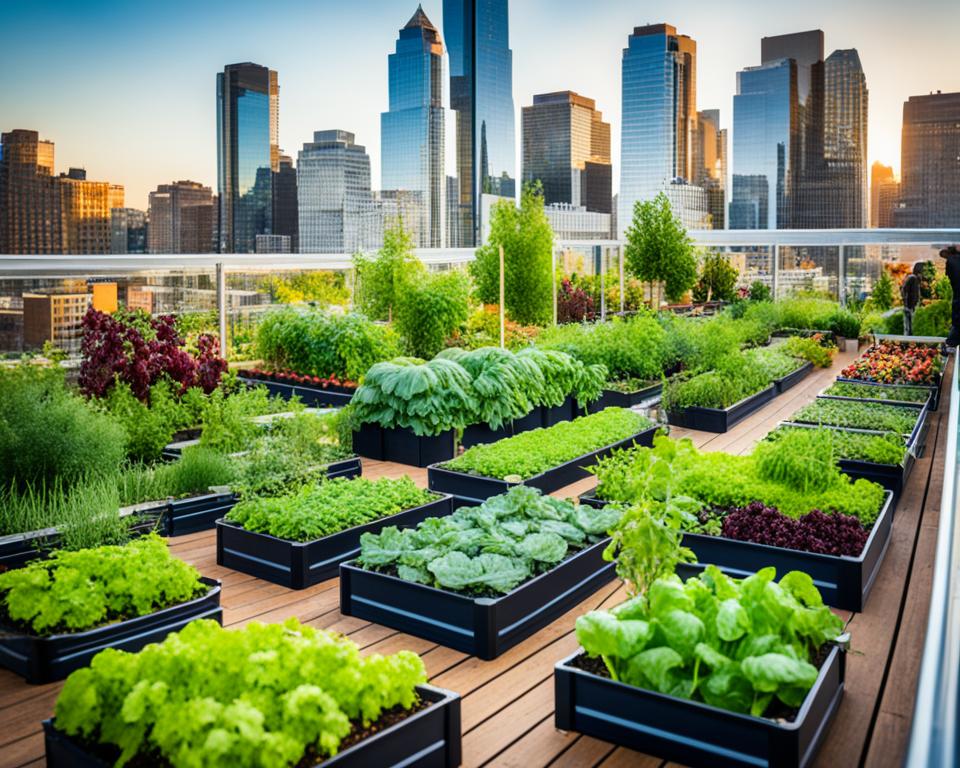Urban agriculture can produce up to 15 times more food per acre than traditional farms. More people are turning to urban gardening, realizing its vast benefits. These benefits include improved food security, self-sufficiency, better mental health, and a lower environmental impact.
Engaging in urban gardening gives us control over our food’s source and quality. It connects us with the plants we grow and the food we eat. Harvesting our fresh produce brings joy and encourages healthier cooking. It lets us taste the real flavors of fruits and vegetables from our own green spaces.
Discovering the Joys of Urban Gardening
Urban gardening is a complex skill that overcomes the challenges of growing food in cities. It involves smartly using small spaces for producing nutritious food. By this, we dive into sustainable food practices that bring health benefits. It’s not just about what we harvest but what we learn, especially valuable for teaching children. It shows them where food comes from and the effort it takes.
To make the most of little room in the city, several gardening styles are suitable. These include:
- Vertical gardening: Growing plants upwards, not just out to save space
- Container gardening: Cultivating in pots, boxes, and other vessels, perfect for compact areas
- Rooftop gardening: Turning flat rooftops into green havens, supporting local biodiversity
- Hydroponic gardening: Nourishing plants with water and minerals instead of soil, which is great for soil-poor locations
These methods help urban dwellers produce food and more in their own limited spaces. It’s not just about the food; it’s about enhancing our urban environment with greenery and building community bonds. It creates a shared mission among neighbors, who exchange skills, tips, and crops.
The joy of urban gardening is found not just at harvest but in fostering life and nature in the city’s midst.
| Urban Gardening Technique | Benefits | Space Requirements |
|---|---|---|
| Vertical Gardening | Maximizes vertical space, pleasing to the eye | Little |
| Container Gardening | Adaptable, moveable, fits different plant types | Sparse to average |
| Rooftop Gardening | Uses neglected spaces, helps local wildlife | Considerable to wide |
| Hydroponic Gardening | Not dependent on soil, economical water use, quick plant growth | Little to moderate |
Diving into urban gardening unveils not just a means of producing food. It’s a fulfilling path towards well-being and a bond with the natural world. It transforms city living into a richer, greener experience.
Knowing Where Your Food Comes From
Urban gardening enlightens us on the journey of our food, from seed to harvest. We actively participate in its growth, gaining an empowering connection. This deep link allows for wise food choices, benefiting our families.
Gaining Control Over Your Food Supply
Through urban gardening, we reclaim food production. Homegrown fruits and vegetables are ensured to be organic and free from contaminants. We manage every aspect, ensuring our food is delicious, safe, and nutritious.
Urban gardening also enables the growth of unique heirloom produce, valorizing its distinct flavor and health benefits. Preserving such varieties bolsters food supply diversity and protects essential culinary traditions.
Understanding the Growing Process
In urban gardens, we learn to respect the effort and care needed for bountiful harvests. Watching seeds sprout and bear fruit teaches us value. This firsthand experience fosters a strong appreciation of nature and our food’s origins.
Growing our own allows us to savor the ripest, most flavorful fruits and vegetables. Unlike commercially sourced items, our produce isn’t picked early, ensuring optimal freshness. This process improves food quality and reduces the hazards of early picking, like diminished taste and nutrients.
| Aspect | Urban Gardening | Conventional Agriculture |
|---|---|---|
| Food Origins | Known and controlled by the gardener | Often unknown or unclear |
| Chemical Use | None, organic growing methods | Pesticides and herbicides often used |
| Heirloom Varieties | Can be grown and preserved | Rarely cultivated due to commercial constraints |
| Freshness | Harvested at peak ripeness | Often picked early to withstand transportation |
Urban gardening lets us control our food’s path, guaranteeing organic purity and enhancing food knowledge. It benefits us and our communities, fostering sustainability and stronger bonds through shared homegrown food.
Developing a Deeper Respect for Fruits and Vegetables
Starting our urban gardening journey introduces us to the complex processes of plant nurture. We learn from sowing seeds to the full cycle of growth and ripening. This experience deepens our respect for homegrown fruits and vegetables.
Hands-on, we discover sun, water, and nutrient needs differ for each plant. For instance, tomatoes and peppers love warmth, yet lettuce and spinach thrive in cooler settings. This understanding enhances our respect for food diversity.
Patience and tenacity come into focus in urban gardening. Some plants, like carrots and beets, need a longer growth period. Others, including radishes, are quick to harvest. This process shows us the value of time and effort in food production.
Observing our garden’s resilience, we face challenges like pests and diseases. Our plants often overcome threats, showing incredible strength. So, we learn to admire the fighting spirit of nature.
“To plant a garden is to believe in tomorrow.” – Audrey Hepburn
Furthermore, urban gardening deepens our bond with nature and supports eco-friendly living. Growing our food cuts down on environmental harm from conventional farming. We also reduce the distance our food travels, diminishing our carbon footprint. This makes us treasure our harvest even more.
Ultimately, engaging in urban gardening sparks true gratitude for the variety of foods that sustain us. This transformative journey teaches us about the labor and natural processes behind every meal.
Experiencing the Beauty and Rewards of Growing Your Own Food
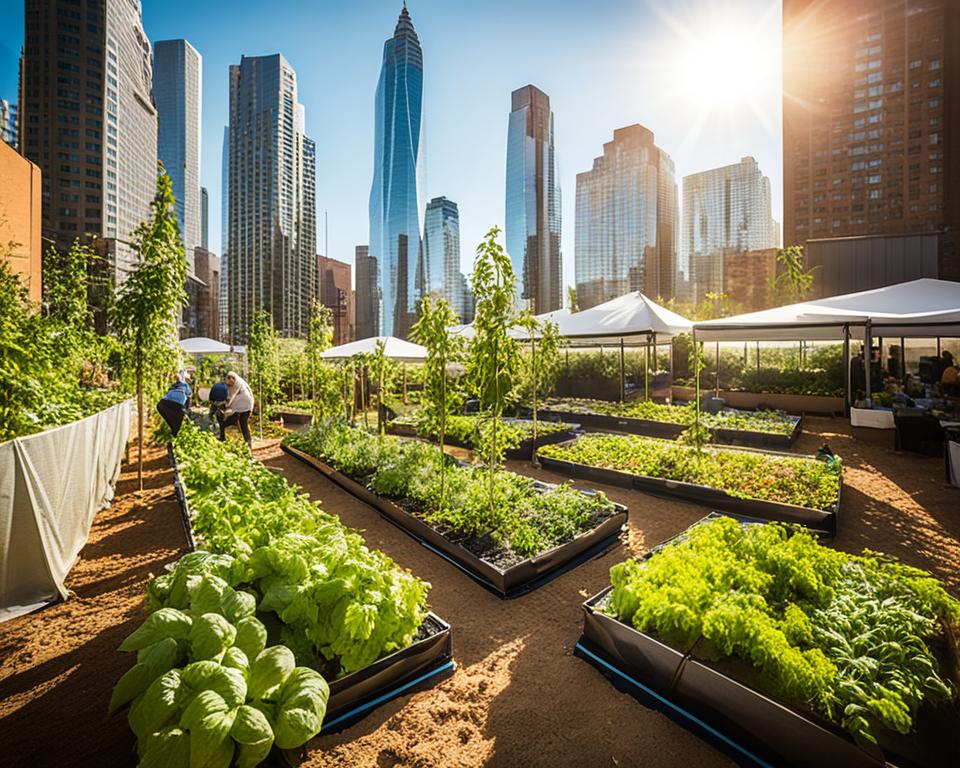
Urban gardening offers a unique connection with the natural world. It lets us grow our food, forming a profound relationship with plants. We start with small seeds and see plants mature into bounteous producers.
Caring for these plants is deeply gratifying. We invest our time and energy to ensure they flourish. It’s about providing the right conditions and observing their growth with wonder.
From the first sprout, urban gardening captivates us. We nurture our green friends, celebrating every new leaf. Witnessing the development from seeds to substantial plants is both humbling and inspiring.
Take tomatoes, initially fragile, yet soon becoming formidable vine-like structures. Their blooming and fruiting represents both nature’s might and the gardener’s work.
Harvesting the Fruits of Your Labor
Gathering our grown food is a special moment in urban gardening. It’s the end product of weeks of attention and care, something we saw flourish from inception.
Then comes the enjoyment of fresh, in some cases organic, produce. This garden-to-table journey deeply links us with our meals. The taste is unmatched, rich in flavor and nutrients.
Urban gardening, more than a hobby, bonds us with nature and our food. Growing our food imbues us with joy and pride. It’s a journey full of lessons and enchantment.
Feeling a Sense of Pride and Satisfaction
Growing our own food in the city fills us with profound personal pride. The journey from tiny seeds to flourishing plants is captivating. This nurtures a profound bond with our food, leading to a matchless sense of satisfaction.
Serving Homegrown Produce to Your Family and Friends
There’s immense joy in urban gardening by sharing produce with those we love. Making a vibrant salad or grilling fresh veggies for a barbecue adds joy to dining. Observing loved ones enjoy the flavors and recognizing our work is rewarding.
Preserving Your Own Harvests for Later Use
Urban gardening offers not just fresh produce but also preserved delights. We learn to can, pickle, and freeze, which lets us enjoy our harvests long past their season. Imagine winter’s delight from a jar of homemade sauce or a taste of summer berries. This also decreases waste and ensures a supply of healthy food year-round.
The fulfillment from growing, sharing, and preserving our food is unparalleled. Urban gardening allows us to lead in food sourcing, deepen our bond with nature, and relish our achievements in delightfully tasty ways.
Encouraging a Healthier Lifestyle Through Gardening
Urban gardening is a potent means to push for a healthy lifestyle. When we cultivate our organic produce, our eating habits tend to improve significantly. We become more inclined to cook regularly with the fresh ingredients from our gardens, which stimulates new culinary adventures.
There’s a gratifying feeling in reaping our own fresh, nutrient-packed crops. The act of gathering ripe tomatoes, lettuce, or herbs from our yard boosts our consumption of these items. This, in turn, greatly impacts our health, as these fresh foods are rich in vitamins, minerals, and fiber.
Beyond its health merits, urban gardening fosters creativity in the kitchen. The abundance of fresh picks often leads to experimenting with various dishes. That zucchini from our garden may become a delightful zucchini bread, and our homegrown tomatoes could morph into a stunning pasta sauce. This endeavor inspires culinary creativity.
Growing your own food is like printing your own money. – Ron Finley, urban gardening activist
Additionally, urban gardening supports mental well-being. Observing the growth of our plants from seeds to flourishing crops can be calming. It acts as a form of therapy, reinforcing our sense of accomplishment and purpose. These benefits contribute to a healthier and balanced life.
| Benefits of Urban Gardening for a Healthy Lifestyle | Examples |
|---|---|
| Increased consumption of fresh, nutritious food | Harvesting ripe tomatoes, crisp lettuce, and fragrant herbs |
| Cooking inspiration and culinary exploration | Trying new recipes and techniques with homegrown produce |
| Stress reduction and mental well-being | Nurturing plants and finding purpose in gardening activities |
Choosing urban gardening means electing to enrich both our physical and mental health. It influences us to choose healthier food options, pushes culinary boundaries, and fosters contentment in gardening. It is an invitation to enjoy and benefit from the cultivation process. So, let’s engage in this rewarding activity. Let’s welcome the ways urban gardening enriches our lives, making them brighter and more satisfying.
Connecting with the Seasons and Eating Seasonally
Urban gardening allows us to sync with nature’s season changes and adjust our diets. It shows us the beauty of seasonal foods, inspiring us to eat more varied and nutritious meals. We learn to cherish every phase of the year through what we grow and eat.
Exploring Diverse Seasonal Varieties
In cities, we can grow a plethora of fresh, seasonal produces not typically found in markets. We move away from relying on imported, out-of-season goods. Instead, we find joy in seasonal gems:
- Spring: Asparagus, peas, radishes, spinach, and lettuce
- Summer: Tomatoes, peppers, eggplants, zucchini, and berries
- Fall: Squash, pumpkins, kale, brussels sprouts, and apples
- Winter: Carrots, parsnips, turnips, beets, and citrus fruits
Exploring these foods introduces us to a rich tapestry of tastes. We come to understand and value the distinct flavors and textures of fresh produce. It also encourages creativity in our cooking, which enhances our enjoyment of the food.
Adapting Your Diet to the Natural Cycles
Gardening in urban spaces teaches us to align our diets with seasonal changes. This approach allows us to intake the freshest, most flavorful produce. It also meets our body’s varying nutritional demands through the year:
| Season | Dietary Focus | Benefits |
|---|---|---|
| Spring | Light, cleansing foods | Supports detoxification and renewed energy |
| Summer | Cooling, hydrating foods | Helps balance heat and maintain hydration |
| Fall | Grounding, nourishing foods | Prepares the body for the colder months ahead |
| Winter | Warming, comforting foods | Boosts immunity and provides essential nutrients |
This natural approach enhances our health and connects us to the earth’s rhythms. Through gardening, we intimately experience the seasons. The cycle of growth and harvest reflects the cycle of life, teaching us about sustenance and renewal.
Rediscovering the True Flavors of Fresh Produce
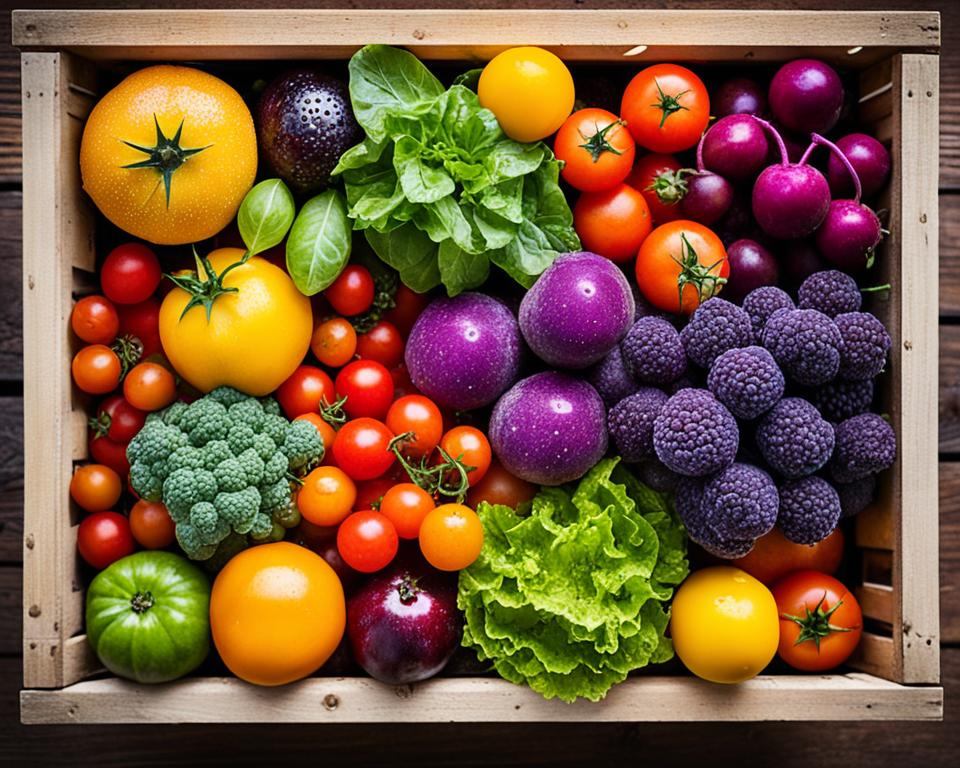
Urban gardens offer a chance to rediscover fresh produce flavors. Growing our own fruits and vegetables lets us taste the many subtle tones. Store-bought options often lack this variety and freshness. Harvesting produce at its ripest ensures an unbeatable taste and texture.
Many store-bought items prioritize looks and shelf life over taste. Yet, our own harvests can prioritize flavor. Choosing exceptional-tasting varieties means we savor the true essence of each item. We explore the nuances in flavor, noticing subtleties influenced by soil and climate.
Homegrown items are richer in taste because they’re picked at the perfect moment. This is particularly noticeable with berries and tomatoes. These fruits lose their essence quickly after picking. Growing them ourselves guarantees enjoying their prime flavors.
The flavor nuances in homegrown produce are a revelation. From the bright, tangy notes of a freshly picked tomato to the crisp, sweet crunch of a garden-grown carrot, each bite is a testament to the quality and care that goes into growing our own food.
Through urban gardening, we grow fond of the array of tastes in fresh produce. Getting in sync with the garden’s seasons adds to the joy. Waiting for, then tasting, each new harvest is a delight. It not only enhances our meals but deepens our bond with nature.
Attracting Pollinators and Supporting Biodiversity
Urban gardening not only beautifies but also nurtures a rich ecosystem, promoting biodiversity. Our gardens draw in crucial pollinators like bees and butterflies, enriching our harvest and the environment’s health. These pollinators are essential for many plants, including the ones we cultivate, to reproduce.
Creating a Mutually Beneficial Relationship with Pollinators
For our urban gardens to flourish, it’s key to grow a diverse array of flowers that offer pollen and nectar. Selecting flowers with staggered bloom times ensures a steady food supply for pollinators. Lavender, marigolds, zinnias, sunflowers, and cosmos are top choices for this purpose.
When pollinators visit and feed on these flowers, they unknowingly aid in pollination by moving pollen from one plant to another. Enhancing pollinators’ lives means better garden productivity. It’s a win-win that promotes mutual growth and sustains urban greenery.
Contributing to a Thriving Ecosystem
Acting as hubs for pollinators, our urban gardens transform into lively ecosystems. They not only benefit from the plants but also give rise to a variety of populations, from beneficial insects like ladybugs to small animals. Thus, they support a spectrum of life.
An increase in such pollinator-friendly spaces aids in urban ecosystem health. It counteracts habitat destruction by fostering the growth of various critical species. This effort not only enhances urban farming but also cements our part in nurturing the environment’s equilibrium amidst city living.
Reducing Waste Through Composting
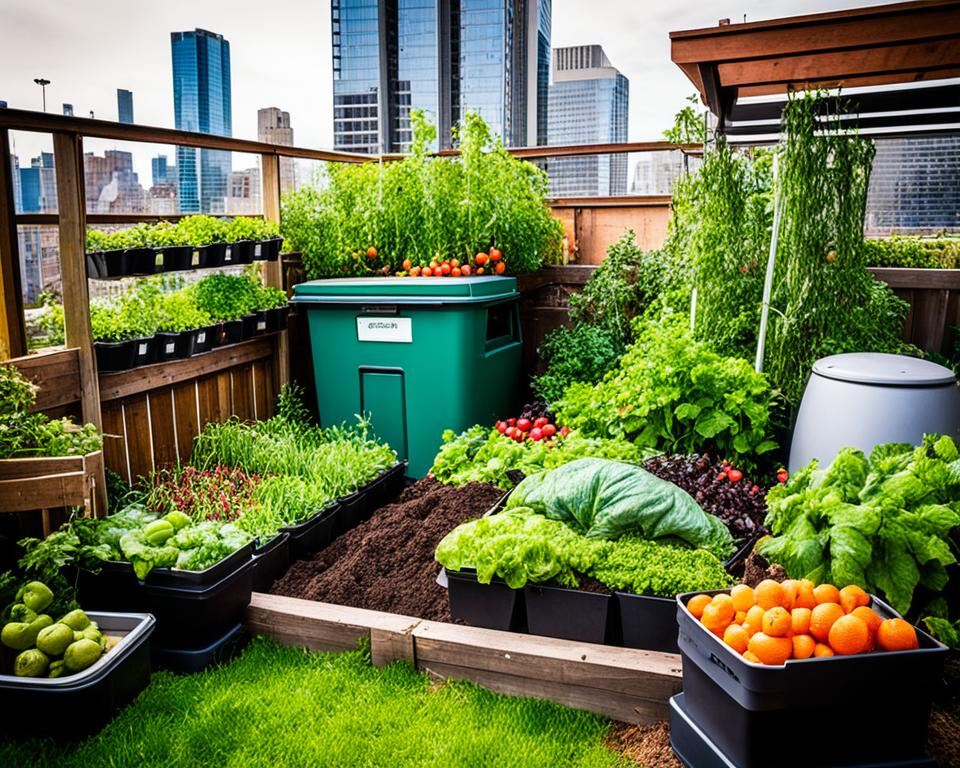
Urban gardeners witness the balanced food cycle nature creates. Composting in our gardens can reduce organic waste greatly. It shows that nothing is truly waste in nature. Besides, it enriches our soil and plants with vital nutrients.
Closing the Loop in the Food Cycle
Nature recycles and reuses nutrients in a continuous food cycle process. By composting what we no longer need, we mirror this cycle. This way, we ensure that nutrients go back to the soil. Composting lets us close the loop in the food cycle, slashing waste and our environmental footprint.
It allows us to:
- Divert organic waste from landfills
- Reduce greenhouse gas emissions
- Create a valuable resource for our plants
- Promote a more sustainable lifestyle
Nourishing Your Soil and Plants with Compost
Compost acts as a natural, nutrient-rich fertilizer for our gardens. Adding compost enhances soil structure and its water-holding ability. It also serves as a crucial nutrient source for plants. Compost’s microorganisms fight plant diseases and support root health.
Did you know that compost juice, the liquid that drains from your compost pile, is a potent natural fertilizer? Dilute it with water and use it to feed your plants for an extra nutrient boost!
To get the most out of composting, keep these tips in mind for your urban garden:
| Composting Tip | Benefit |
|---|---|
| Maintain a balanced mix of green and brown materials | Ensures proper nutrient balance and optimal decomposition |
| Keep your compost pile moist but not soggy | Promotes healthy microbial activity and prevents odors |
| Turn your compost pile regularly | Accelerates the decomposition process and prevents compaction |
| Harvest finished compost when it resembles dark, crumbly soil | Ensures your compost is ready to nourish your plants |
Embracing composting in urban gardens cuts waste and feeds our plants. It also deepens our understanding of nature’s balance. Witnessing the transformation of waste into rich compost fosters sustainable and mindful gardening.
Finding Stress Relief and Mindfulness in Gardening
City life’s rapid pace often leaves us feeling tense and anxious. Yet, urban gardening provides a unique chance for stress relief within city borders. It allows us to escape momentarily from our hectic schedules and find peace in nature. Tending to plants presents an opportunity to slow down, breathe, and experience a sense of tranquility.
Engaging in gardening acts as a form of meditation. It enables us to focus solely on the present, whether we are sowing seeds, watering, or trimming. With such focus, our minds clear of worry, fostering a deep sense of calm. This experience becomes even more valuable in cities, where green areas are sparse.
Nurturing plants and witnessing their growth is profoundly soothing. It teaches us patience and allows faith in the natural order of life to flourish. Moreover, daily plant developments bring us immense joy, highlighting the joy of caretaking. It’s a simple yet impactful way to care for another living entity.
Gardening is the art that uses flowers and plants as paint, and the soil and sky as canvas. – Elizabeth Murray
Urban gardening is an excellent retreat from city stress. Our garden spaces, whether personal, shared, or on a community rooftop, transport us to a serene universe. Here, nature’s elements envelop us, creating a calming atmosphere. This natural immersion acts as a balm, lowering our stress and anxiety levels.
Urban gardening offers numerous stress-relief and mindfulness benefits:
- Physical exercise in the form of gentle gardening movements that reduce stress.
- Engage in creativity through garden design, an enjoyable and fulfilling pastime.
- Achieve a sense of pride by successfully growing plants and picking produce.
- Work and connect with others through community gardening, fostering social bonds.
| Gardening Activity | Stress Relief Benefit |
|---|---|
| Planting seeds or seedlings | Encourages mindfulness and focus on the present moment |
| Watering plants | Provides a calming and meditative experience |
| Pruning and maintaining plants | Offers a sense of control and accomplishment |
| Harvesting produce | Brings joy and satisfaction from reaping the rewards of hard work |
Adopting urban gardening into our lifestyle is a powerful means of stress management and enhancing mindfulness. This connection with nature, despite city life’s chaos, promotes inner peace. It urges us to slow our pace and take notice of the enduring beauty around us.
urban gardening benefits
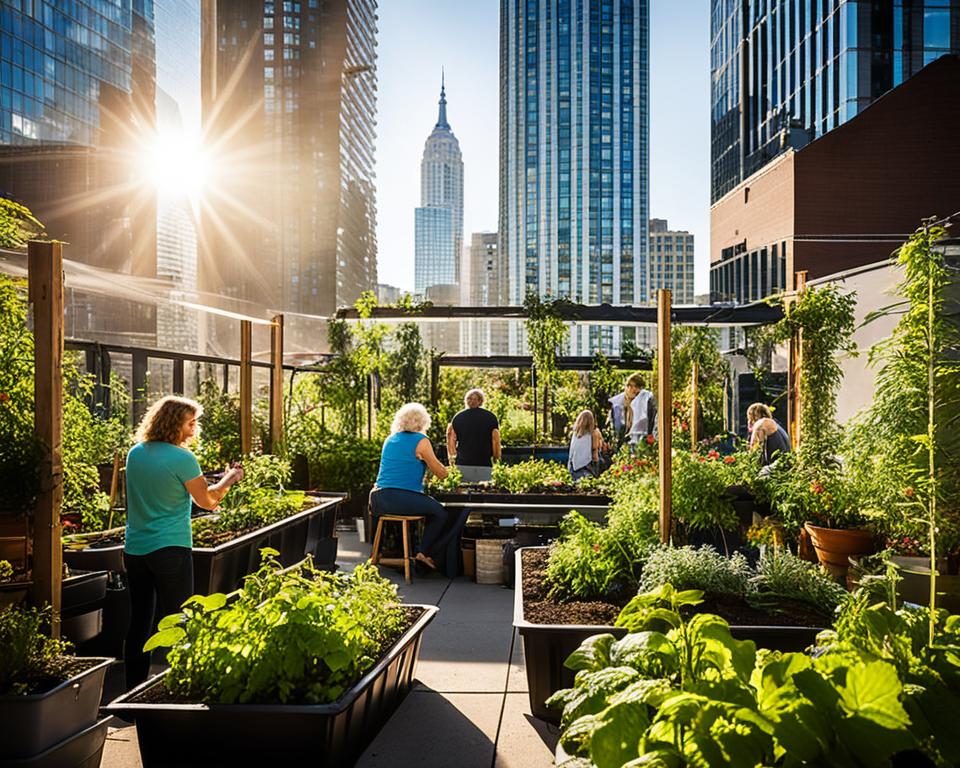
Urban gardening goes beyond just growing food. It addresses important issues like food insecurity and the lack of fresh produce access. It also reduces the environmental impact of our food system. Furthermore, it builds a strong community among city residents.
Improved Food Security
Urban gardens are crucial for fighting food insecurity in cities. They let people grow their own nutritious food cheaply. This ensures everyone has a steady food source, especially in areas with few healthy options.
Increased Access to Fresh, Healthy Produce
Fresh fruits and veggies are often too expensive in cities, making it hard for some to eat healthily. Urban gardens change this by offering fresh, healthy produce. They empower us to pick what we grow, focusing on nutrition and health.
Reduced Environmental Impact
Gardening in the city helps the planet in big ways. It cuts down on the long trips food takes to get to us, lowering the carbon footprint. Gardens also use less water, saving a valuable resource. These efforts help us care for the earth while enjoying fresh produce.
Strengthened Community Bonds
Urban gardens are not only about food; they’re also about forming a community. People working together to grow food build strong relationships. These projects unite people from different backgrounds, making the community tighter. By working side by side towards a common goal, urban gardening weaves our communities together.
| Benefit | Description |
|---|---|
| Food Security | Provides access to fresh, affordable food |
| Healthy Eating | Increases availability of nutrient-dense produce |
| Eco-Friendly | Reduces carbon footprint and conserves water |
| Community Building | Fosters connections and social cohesion |
Understanding and adopting urban gardening’s benefits is key to a better, fairer, and closer city future. It allows us to grow healthier communities, one garden at a time.
Passing on Valuable Knowledge to Future Generations
Urban gardeners hold a distinct role as key educators, transferring crucial knowledge to younger individuals. Since schools often overlook gardening, it is left to us to enlighten kids on the joys and advantages of cultivating their food. By teaching them sustainable means and weaving a bond with nature, we ignite a passion among the youth for this fulfilling endeavor.
We educate the youth on farming fruits and veggies, guiding them from the start with seeds to the final harvest. This practical engagement allows us to instill the values of sustainability, caring for the planet, and the significance of a healthy natural bond. In doing so, we plant the seeds for the kids’ lasting enjoyment of fresh, nutritious foods and the worth of self-reliance.
By sharing our urban gardening knowledge and enthusiasm, we secure this meaningful tradition for the years ahead. In this regard, we empower subsequent generations to involve themselves in the food cycle and select wisely what they eat. Our sharing of wisdom not only enhances community health but also deepens the understanding of the links between our food, natural surroundings, and our well-being.

